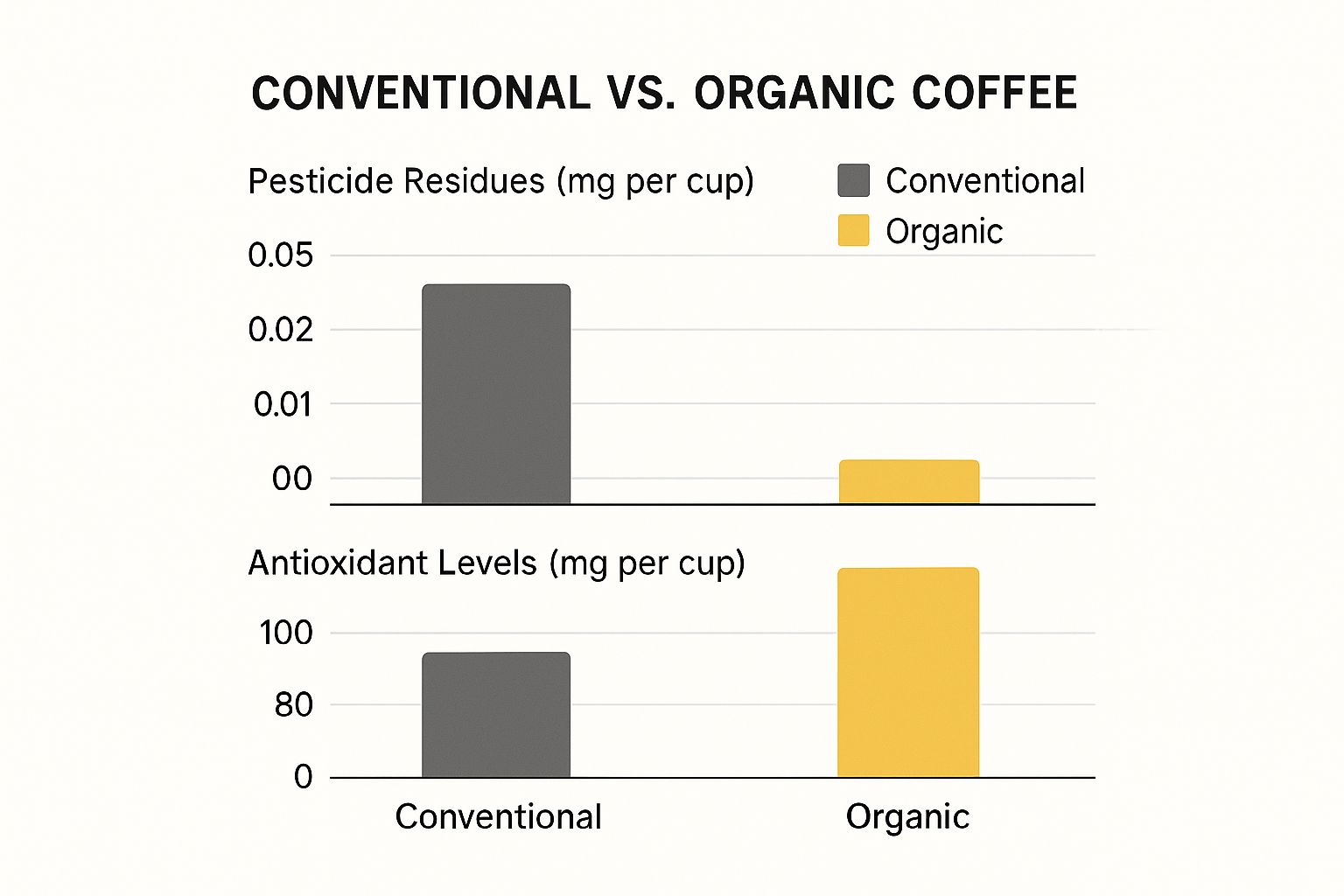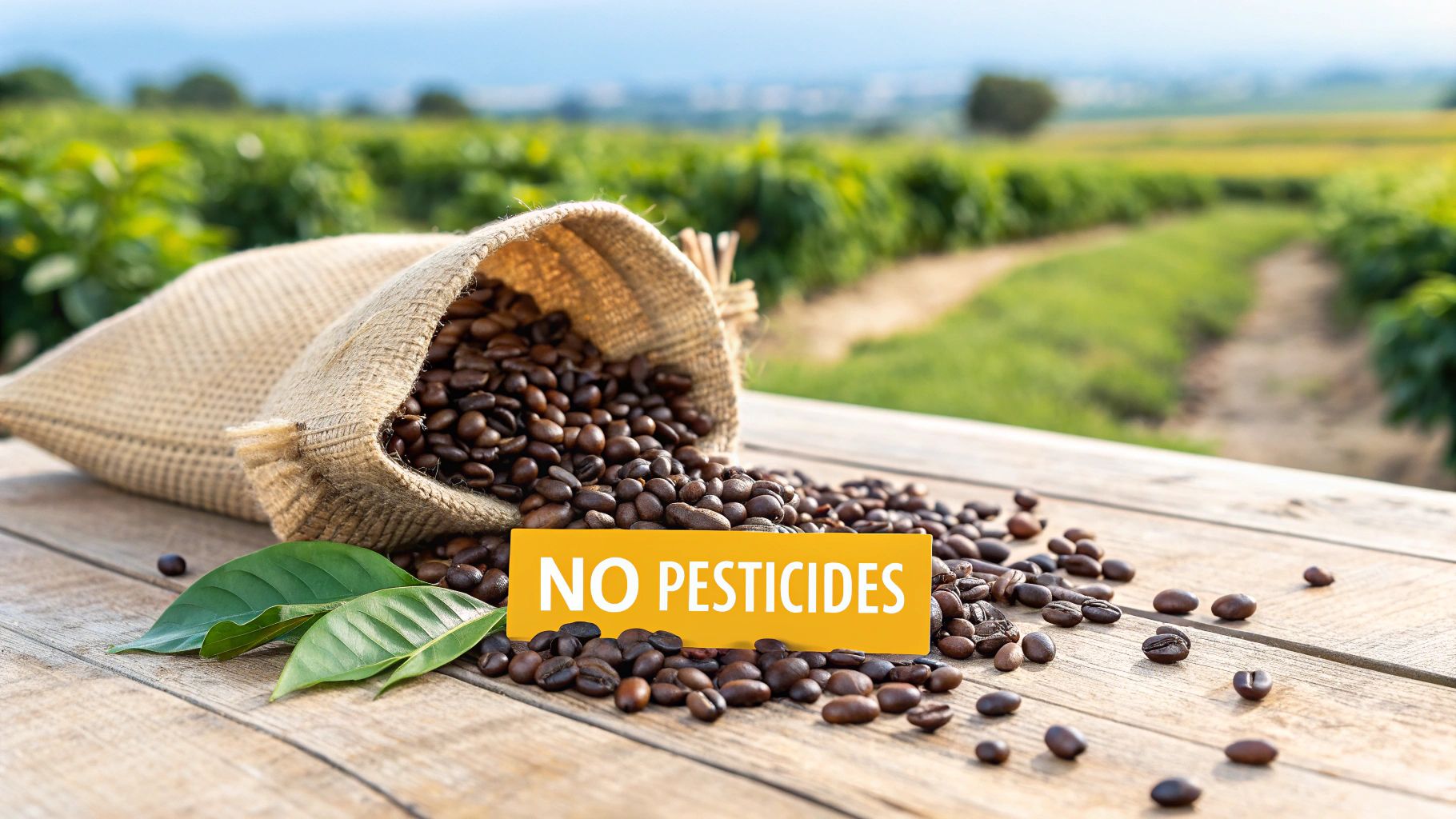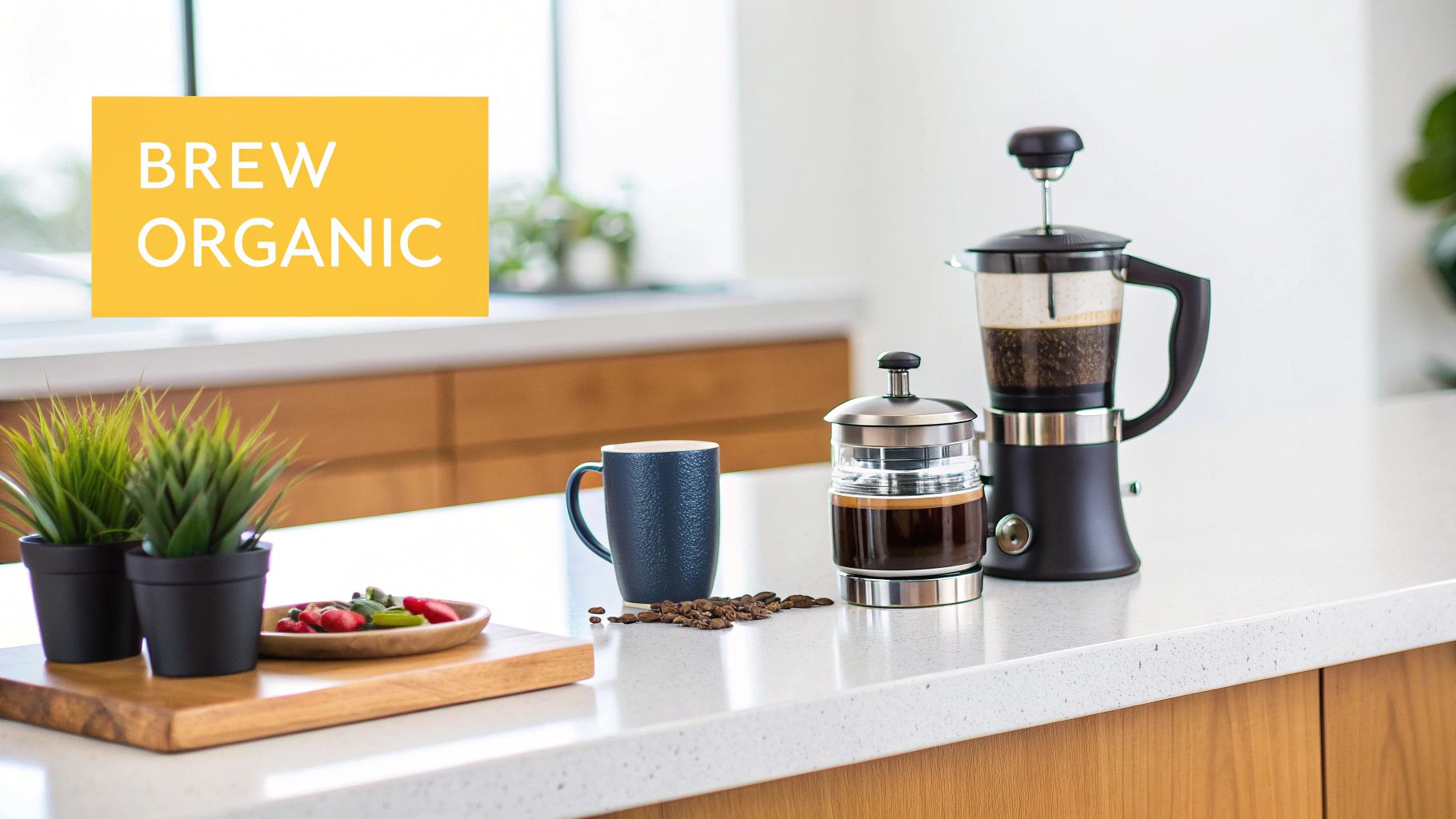The real magic of organic coffee lies in what it’s missing: a cocktail of synthetic pesticides and herbicides. When you choose organic, you’re getting a cleaner cup. This simple choice lets coffee's natural antioxidant content shine through, helping to support your cells and keep inflammation in check.
It’s an easy switch that elevates your daily ritual from a simple habit to a proactive step toward better health.
Why Your Daily Coffee Should Be Organic
That morning cup of coffee is more than just a wake-up call—it's a direct delivery of whatever was used to grow those beans. So, what really sets organic coffee apart from the rest?
Making the switch to organic is one of the most impactful upgrades you can make to your routine. It transforms your coffee from a mere caffeine fix into a genuine wellness tool. Let's break down how this simple decision helps you dodge hidden pesticides, tap into a richer source of antioxidants, and support your body for the long haul.
The logic is straightforward: a cleaner bean makes for a better, healthier brew. These aren't just abstract ideas, either; the differences are real and measurable.
Key Differences at a Glance
- No Synthetic Pesticides: You might be surprised to learn that conventional coffee is one of the most chemically-treated crops in the world. Organic farming standards, on the other hand, strictly forbid the use of synthetic pesticides, herbicides, and fertilizers.
- More Nutrient-Dense: The rich, healthy soil used in organic farming isn't just good for the planet—it can also produce coffee beans with a higher concentration of beneficial compounds.
- Better for the Environment: Organic practices are designed to work with nature, not against it. They promote biodiversity and improve soil health, creating a more sustainable system for everyone.
This infographic lays out the tangible differences you’ll find in pesticide residue and antioxidant levels when comparing conventional and organic coffee.

The takeaway is clear. Brewing organic coffee gets rid of the pesticide exposure while delivering a bigger payload of health-promoting antioxidants in every single cup.
Avoiding Pesticides in Your Morning Cup

One of the most powerful organic coffee health benefits is about what’s not in your mug. Conventional coffee is one of the most chemically treated crops on the planet. Think of it like this: you wouldn't knowingly choose an apple that's been doused in chemicals over one grown naturally. The same logic applies directly to your coffee beans.
To maximize their yield, conventional coffee farmers often rely on a cocktail of synthetic pesticides, herbicides, and fertilizers. Traces of these chemicals can linger on the coffee cherries, survive processing and roasting, and make their way straight into your morning cup.
Choosing certified organic coffee is a straightforward way to sidestep this unwanted chemical exposure. It’s less about fear and more about making an informed, empowered choice for your well-being.
Why It Matters For Your Health
The real concern isn't a single cup but the cumulative effect over months and years. Consistent, low-level exposure to certain agricultural chemicals has been linked to a range of potential health issues, from hormonal disruption to other chronic conditions. By opting for organic, you're essentially taking these substances out of the equation.
This isn't just theory. An in-depth analysis by the Clean Label Project tested a wide array of coffee products for thousands of contaminants. Their research consistently found that organic coffee had far fewer residues from industrial and agricultural chemicals. When you consider there are over 1 billion coffee drinkers worldwide, that small choice makes a massive difference. You can see the full coffee contaminant study on cleanlabelproject.org.
To make the distinction crystal clear, let's look at a side-by-side comparison.
Conventional vs Organic Coffee: A Quick Comparison
This table breaks down the fundamental differences in how your coffee is grown, highlighting why organic is the cleaner, healthier option.
| Feature | Conventional Coffee | Organic Coffee |
|---|---|---|
| Fertilizers | Relies on synthetic, chemical-based fertilizers. | Uses natural compost, manure, and organic matter. |
| Pest Control | Uses synthetic pesticides and herbicides. | Employs natural methods like beneficial insects and crop rotation. |
| Soil Health | Can lead to soil degradation and chemical runoff. | Focuses on building rich, sustainable, and biodiverse soil. |
| Chemical Residue | Higher risk of chemical residues in the final beans. | Free from synthetic chemical residues, offering a purer product. |
As you can see, the "organic" label signifies a completely different approach to agriculture—one that prioritizes purity from the soil to your cup.
The key takeaway is simple: Certified organic coffee acts as a protective shield, ensuring your daily ritual is as pure and beneficial as possible.
Making this switch is a foundational step in turning your coffee habit into a true health-promoting practice. For a more detailed breakdown, our guide comparing organic coffee vs regular coffee goes even deeper. Ultimately, it’s about savoring coffee for its rich, natural qualities, without the synthetic baggage.
More Antioxidants, More Nutrients

Beyond what you're not getting (like pesticide residues), one of the biggest organic coffee health benefits is what you are getting: a bigger dose of powerful antioxidants. Think of these compounds as a personal security detail for your body's cells, defending them against daily damage.
Antioxidants work by neutralizing unstable molecules called free radicals—the microscopic villains that cause oxidative stress. If you let them run wild, free radicals can lead to inflammation and contribute to a host of chronic health problems.
A simple cup of organic coffee delivers a potent serving of these protective compounds.
It All Starts With Healthier Soil
So, where does this extra nutritional punch come from? The secret is in the soil. Organic farming is all about cultivating rich, living soil that’s packed with nutrients. Instead of relying on chemical fertilizers that can strip the earth over time, organic farmers build it up with compost and natural matter.
This vibrant soil is like a fully stocked pantry for the coffee plant. The plant can pull up a wider array of beneficial minerals and compounds, which it then concentrates directly into the coffee beans. What you get is a bean that’s not only clean but also more nutritionally dense, especially with beneficial polyphenols, a major group of antioxidants.
Simply put, a healthier start in life for the coffee bean—in rich, organic soil—means it can pass more of those protective compounds along to you.
This nutritional advantage offers real support for your well-being. By helping to combat inflammation and oxidative stress, the antioxidants in your morning brew can play a role in everything from cardiovascular health to brain function.
Here's a quick look at what these antioxidants are doing for you:
- Cellular Protection: They act as a shield, guarding your cells against damage from environmental stressors.
- Reduced Inflammation: Chronic inflammation is a known culprit in many health issues, and antioxidants are one of our best natural defenses against it.
- Overall Wellness: Time and again, studies show that a diet rich in antioxidants is linked to better health in the long run.
Ultimately, choosing organic coffee shifts your daily ritual. It's no longer just a caffeine fix; it becomes a meaningful contribution to your daily nutrient intake—a small, delicious investment in your body’s long-term resilience.
Supporting Your Metabolic Health and Longevity
Choosing organic coffee isn't just about what you're avoiding (like pesticides); it's about what you're actively gaining. The natural compounds preserved in a cleaner, organically grown bean can have a real impact on your metabolic health, creating positive ripple effects across your entire body.
One of the most talked-about benefits is coffee's connection to a lower risk of developing type 2 diabetes. This isn't just hearsay—extensive research backs it up. The powerful antioxidants in coffee seem to be a key player, helping improve how your body handles blood sugar.
In fact, a massive review of 30 different studies uncovered a pretty amazing trend. For every daily cup of coffee consumed, researchers saw a 6% lower risk of developing type 2 diabetes. It's thought that coffee helps protect the beta cells in your pancreas, which are responsible for producing the insulin your body needs to function properly. You can read more about the health benefits of coffee at Healthline.com.
From Metabolism to Longevity
This boost to your metabolic system is just one part of a much bigger picture. The health benefits of coffee also tie directly into living a longer, healthier life. When your body's core systems—like blood sugar regulation—are working as they should, you're building a solid foundation for overall vitality.
By helping to reduce the risk of chronic conditions, your daily cup of organic coffee becomes a simple, proactive investment in your future well-being.
Time and again, large studies have connected moderate coffee drinking with a lower risk of death from all causes. The antioxidants and anti-inflammatory compounds in a quality cup of coffee are believed to contribute directly to this, supporting everything from your heart to your brain over the long haul.
And for anyone keeping an eye on their diet, it's a bonus that there are so few calories in black coffee. If you want to dive deeper, check out our guide on the nutritional facts of black coffee. It’s the perfect way to get rich flavor and serious health perks without messing with your calorie goals.
How to Choose and Brew Your Best Organic Coffee

Ready to make the switch to organic? It’s actually pretty simple once you know what to look for. Unlocking the full spectrum of organic coffee health benefits really comes down to two things: choosing the right beans and brewing them properly. Get that right, and every cup becomes a genuinely nourishing experience.
When you're browsing the coffee aisle, the certifications on the bag are your best friend. They cut through the marketing noise and tell you what you’re really getting.
- USDA Organic: This is the big one. Seeing this seal means the coffee was grown and processed without synthetic pesticides, herbicides, or fertilizers. It's your top guarantee that you're avoiding unwanted chemicals.
- Fair Trade Certified: This label is more about the people behind the coffee. It ensures farmers were paid a fair wage and work in decent conditions, which supports a more ethical and sustainable industry.
Here’s another pro tip: always choose whole beans over pre-ground if you can. Grinding right before you brew keeps the fragile, aromatic oils and potent antioxidants intact. Once ground, coffee starts losing its magic—and its health benefits—to oxidation.
Brew for Maximum Health and Flavor
You've got the perfect beans. Now what? Your brewing technique is the final, crucial step. The idea is to pull out all the good stuff (flavor, antioxidants) while leaving any impurities behind.
Start with good water. Using filtered water is a non-negotiable for a clean cup, as it gets rid of chlorine and other contaminants that mess with both the taste and purity of your coffee.
Next, think about your grind. You need to match the grind size to your brew method for the best extraction. A coarse grind is perfect for a French press, but you’ll want a much finer grind for an espresso machine or pour-over. Getting this right is the key to a balanced brew that isn't bitter or weak.
The ultimate goal is to create a pure, flavorful cup that delivers a rich dose of antioxidants. By carefully selecting your beans and refining your brewing technique, you transform your daily coffee into a true wellness ritual.
If you need a little help getting started, check out our guide on the best organic coffee brands to find a roast that’s perfect for you.
Got Questions About Organic Coffee?
Switching to organic coffee is a great step, but it's natural to have a few questions. Getting clear on the details helps you make a choice that truly fits your health goals and daily routine. Let's tackle some of the most common ones.
The first thing most people notice is the price tag. Yes, organic coffee usually costs a bit more. That extra cost is a direct reflection of the farming practices behind the beans—it means no cheap chemical pesticides or synthetic fertilizers. Instead, farmers use sustainable, often more labor-intensive methods that build healthy, vibrant soil.
Think of it as an investment in purity. You're paying for a cleaner bean, free from synthetic residues, which is a core part of unlocking the organic coffee health benefits we've discussed.
Does Organic Coffee Taste Different?
This is a big one. Will you actually notice a difference in the cup? While everyone's palate is different, many coffee lovers describe organic beans as having a cleaner and more defined flavor profile.
When beans are grown in rich, healthy soil without chemical interference, their inherent tasting notes—whether they're fruity, floral, or chocolaty—come through with more clarity. You're tasting the coffee in its purest form. The best way to know for sure? Grab a bag of single-origin organic beans and see for yourself.
How Much Coffee Is Healthy To Drink?
Great question. When it comes to coffee, moderation is definitely the name of the game. So, how much is too much?
A ton of research points to a sweet spot. Major studies, like one that followed over 200,000 people for three decades, found a powerful connection between coffee and a longer life. Drinking 3 to 5 cups a day was linked to a 15% lower risk of premature death from all causes. You can dig into the specifics of these coffee and longevity findings from Harvard's School of Public Health.
For most healthy adults, the general guideline is to stick to about 400 milligrams of caffeine daily. That translates to roughly four 8-ounce cups of brewed coffee, giving you all the benefits without pushing you over the edge.
Ready to experience a cleaner, more flavorful brew? Cartograph Coffee offers premium organic instant coffee, making it easy to enjoy the full health benefits without compromising on taste or convenience.